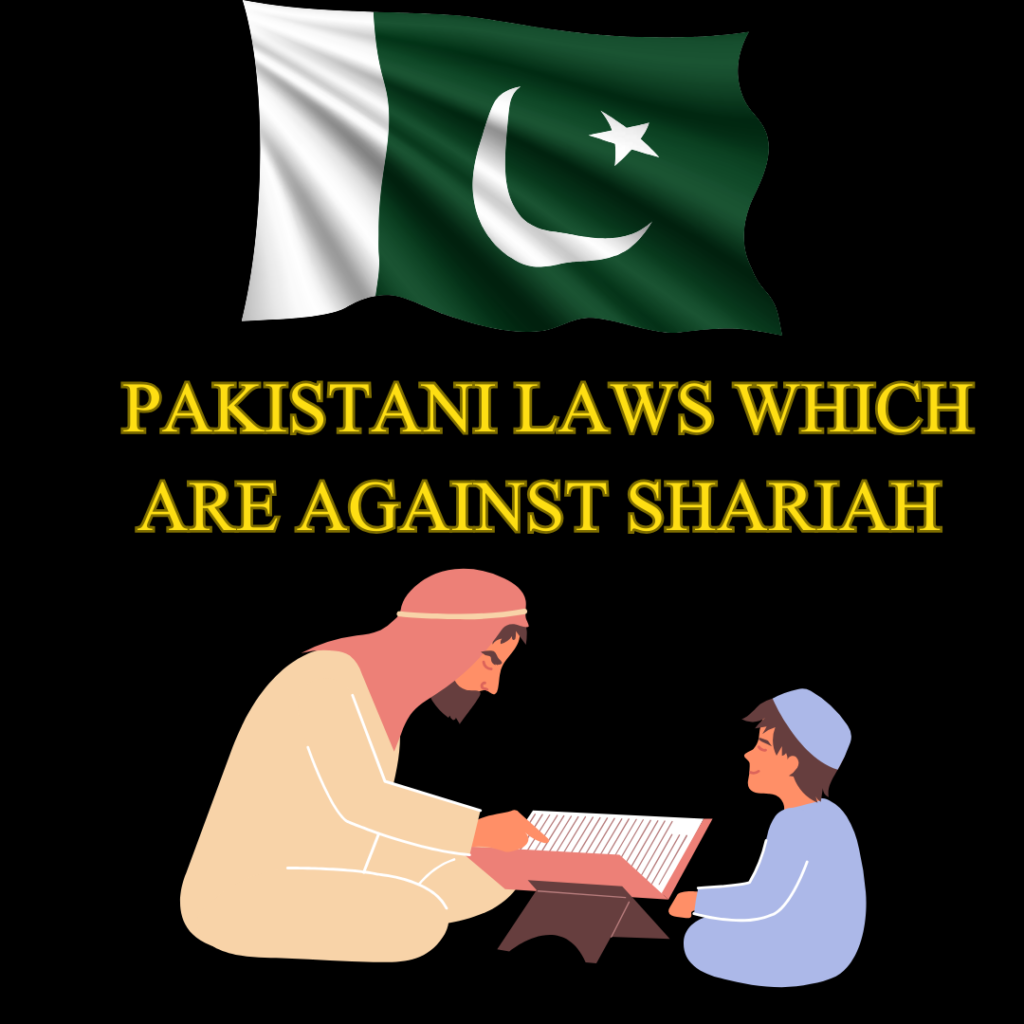
Pakistan, as an Islamic Republic, has a legal system founded on Islamic principles. However, there are instances where specific regulations and laws differ from Shariah (Islamic law). This disparity is typically caused by the coexistence of colonial history, international responsibilities, and contemporary societal needs. This article examines certain Pakistani laws that are in contradiction with Shariah, outlining controversial areas and proposing solutions to curb this issue.
What is Shariah:
Sharia means “the correct path” in Arabic. Sharia is the ideal form of divine guidance that Muslims follow to live a righteous life.
Sharia is derived from two main sources: the Quran, which is considered the direct word of God, and hadith—thousands of sayings and practices. Human interpretations of sharia, or fiqh, are the basis of Islamic law today.
About half the world’s Muslim-majority countries have Sharia-based laws, and most Muslims worldwide follow aspects of Sharia in their private religious practices.
Constitution of Pakistan:
The Constitution of Pakistan sets out certain guidelines concerning the Islamic character of laws. Article 2 stipulates that Islam shall be the state religion and Article 227 mandates that every law shall be brought in conformity with injunctions of Quran and Sunnah and no law repugnant to Islamic provisions shall be enacted by legislature. However, there are certain laws that operate against Islamic injunctions such as banking laws, gender biases in the law of evidence, blasphemy laws, inheritance laws, marriage laws etc.
- Interest-Based Banking Laws:
Islamic law explicitly prohibits riba and interest, as it is considered exploitative and unjust. Despite this, Pakistan’s banking sector is predominantly interest-based, which contradicts Islamic financial principles. Notable laws included the Banking Companies Ordinance 1962 and the Banking Act, 2009.
Most banks in Pakistan provide interest-based services, which are used by a large portion of the populace. The Federal Shariat Court (FSC) in 2022 directed the federal government to facilitate all loans under an interest-free system, thereby declaring the prevailing interest-based banking system as against the Sharia. The court ruled that the federal and provincial governments must amend relevant laws and issued directives that the country’s banking system should be free of interest by December 2027.
Despite this court verdict, federal and provincial governments have not shown any efforts to culminate interest-based practices in the banking sector. The cumbersome financial conditions and international obligations of the country pose an impediment to Islamic banking. Moreover, the recent 3-year staff-level agreement with the International Monetary Fund (IMF) also raises question marks on the government’s efforts in eliminating riba and interest from financial transactions.
In Pakistan, Islamic banking resurged substantially in the early 2000s, with the establishment of the country’s first wholly Islamic bank, Meezan Bank. With multiple banks currently establishing Islamic banking divisions, this alternative has a significant 20% market share in the banking business.
One way in which the government can ensure the Islamic financial model is borrowing through Sharia-compliant bonds or Sukuks — a Sharia-compliant system of borrowing that gives the lender partial ownership of an asset owned by the borrower till repayment of the loan, as it has already done in the past, but it all depends on the willingness of bilateral or multilateral partners.
2. Law of Evidence( Qanoon e Shahadat Order, 1984) and Oral Testimony Conditions:
Islamic law of evidence stipulates strict conditions regarding number, character, screening, and rejection of witnesses, which are not taken seriously by Qanun-e-Shahadat Order and need to be analyzed and compared in detail to
have a better picture of lacunas present in Qanun-e-Shahadat Order. The detailed conditions imposed by Islamic law regarding authentication of women’s testimony, hearsay rule, and purgation process are also not legislated in QSO according to the spirit of Islamic law.
In cases of Ḥudūd, the rules of testimony are more stringent. Women are specifically excluded from being witnesses in these cases. Witnesses in ḥudūd and qiṣas must be male and thus the evidence of a woman is not admissible in these instances. The numerical strength of the witness varies according to the nature of the matter. Islamic law requires the testimony of four men in the crime of fornication and slandering. All the other Ḥudūd offenses and punishment of Qiṣāṣ require two male witnesses. Two male witnesses are required in cases of commercial transactions. If two male witnesses are not available, then the testimony of two women and one man is admissible. In the Qanoon e Shahdat ordinance, conditions regarding the number of witnesses are not applicable for Hudood cases. The most important matter of Hudood laws is neglected by Qanoon e Shahadat as if it does not exist. It vaguely states that all other matters other than financial matters would be testified by one male or one female testimony.
In Islamic law, the Testimony of a master for a slave is not admissible because the money of the slave belongs to the master and it is considered as testimony for one’s own self.
It is also agreed by a few jurists that spouses are not allowed to testify for each other. The same is true of parents and their offspring. Neither of them can testify for each other.
There is no such restriction in Qanoon e Shahadat law regarding the conditions of witnesses who testify for their close relations. Spouses can testify for each other; sons can testify for their parents. The child’s testimony is admissible. Qanūn -e-Shahādat does not specify any such condition. In fact,
Article 3 stipulates such conditions but unfortunately makes it ineffective by providing an except provision that “where such witness is not forthcoming the Court may take the evidence of a witness who may be available.”There is no system for any screening of witnesses. That is why the whole fabric of the judicial system is torn. The witnesses take oath in court and lie in front of the judge in the courtroom.
3. Section 4(1) of the Muslim Family Law Ordinance, 1961:
Section 4(1) of the Muslim Family Law Ordinance, 1961 also remained subject of debate as being against the tenets and provisions of shariah. Section 4(1) of the Muslim Family Laws Ordinance, 1961, deals with the right of a predeceased son’s children (the grandchildren) to inherit the share their father would have received if he were alive. Specifically, it states:
“In the event of the death of any son or daughter of the propositus before the opening of the succession, the children of such son or daughter, if any, living at the time the succession opens, shall per stripes receive a share equivalent to the share which such son or daughter, as the case may be, would have received if alive.”
This concept is known as “ representation” and it allows grandchildren to inherit from their grandparents directly in place of their deceased parents. However, in Islamic law and jurisprudence, using the doctrine of representation for the purpose of determining who is entitled to inherit, the principle of exclusion (nearer in degree excluding the remote) is not curtailed or suspended. Thus, if A dies leaving him surviving a son and grandsons by a predeceased son, the grandsons are excluded from inheritance by their uncle. They do not take in their father’s stead though he would have been an heir had he survived his father. This is true in Shia and Sunni Law alike.
The proponents of this section argue that this law was incorporated by legislators with a view to protecting the rights and financial interests of grandchildren. Being excluded by heirs of nearer degree, the orphaned grandchildren become economically and socially vulnerable. So all over the Muslim world, the jurists thought and tried to solve this problem, using different devices, intending to preserve the interest of the orphaned grandchildren in the property of the propositus and that’s why section 4(1) was incorporated into Muslim Family Law Ordinance, 1961.
But the primary reasons that were emphasized by ulema and opponents for challenging the vires of section 4(1) is that various verses of Surah Nisa plainly establish the manner in which inheritance shares were to be divided, and nowhere does it specify that a grandchild shall be given a share of inheritance as other Sons of the propositus. Moreover, as stated by the Holy Prophet in a hadith:
“Give the shares of the inheritance as prescribed in the Holy Quran to those who are entitled to receive it, then whatever remains, should be given to the closest male relative of the deceased.”
It is clear from the above sources of Islamic law that the principle of inheritance favors those closer in kinship and precludes the remoter from inheritance, and this rule has no exception. Grandchildren are only to be considered as one’s own children in the distribution of inheritance provided that none of the propositus’ children is still alive. The grandchildren, therefore, have been particularly excluded from inheritance if other children of the propositus are still alive.
In summary, section 4(1) of the Muslim Family Law Ordinance has been a debating point among Islamic scholars and modern legislators who want to ensure social equality for grandchildren but Islamic provisions demonstrate that it is against the principles of the Quran and Shariah.
Conclusion:
The convergence of Pakistani law and Shariah creates a complicated landscape in which legislative reforms, societal concerns, and religious precepts frequently collide. Understanding these conflicts is critical for understanding the legal system and encouraging communication between traditional Islamic law and modern legal procedures. Pakistani lawmakers must strive to amend banking laws so as to make them interest-free and to propose necessary amendments in the Qanoon e Shahadat Ordinance and Muslim Family Law Ordinance in order to align them with the tenets of Sharia.

